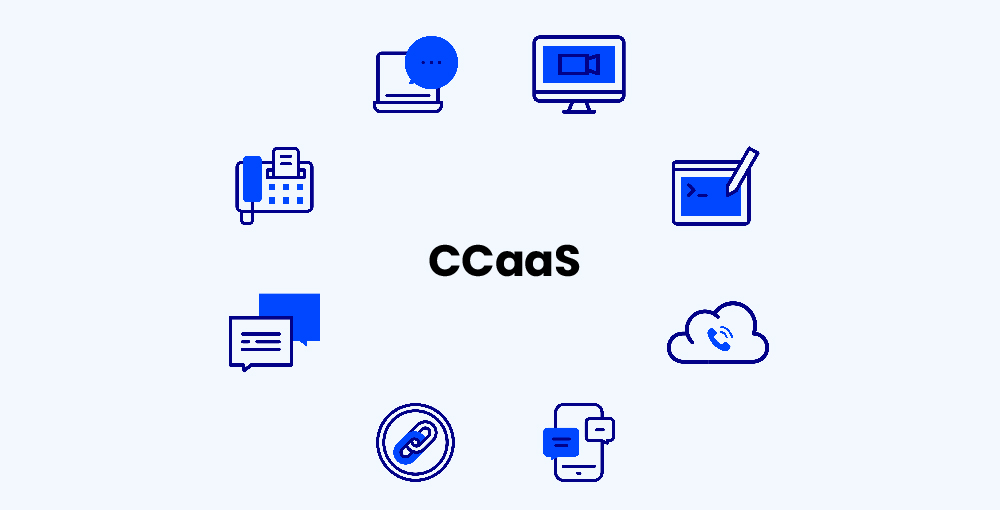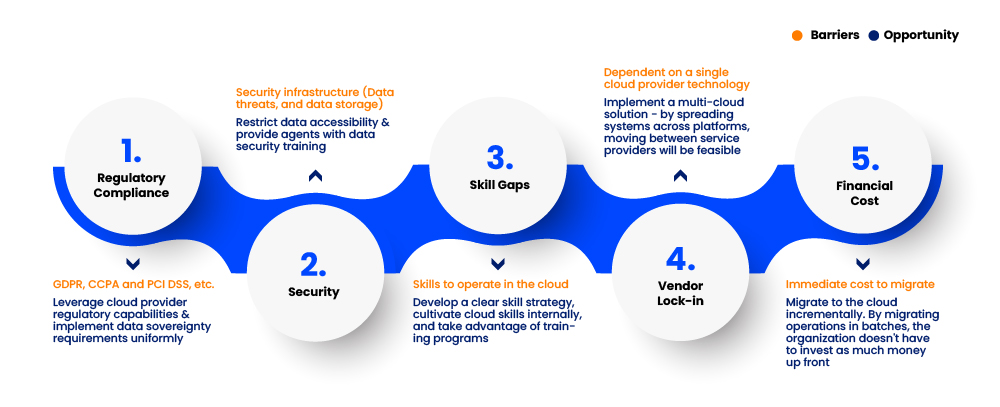In today’s highly competitive business environment, organizations are constantly seeking ways to improve their customer service and support capabilities. One of the most significant shifts in this area has been the emergence of Contact Center as a Service (CCaaS) solutions.
In this article, we will delve into the world of CCaaS, exploring its benefits, reasons for adoption, and how it can revolutionize customer experience. Furthermore, we will discuss the advantages of integrating CCaaS with Customer Relationship Management (CRM) systems for businesses.
What is CCaaS?
Contact Center as a Service (CCaaS) refers to cloud-based contact center solutions that enable businesses to manage their customer interactions through various channels, such as voice, email, texting, social media, and video.
CCaaS providers host the necessary infrastructure and applications, allowing companies to focus on delivering exceptional customer service without the need to invest in, maintain, and upgrade on-premise equipment and software.
One example of CCaaS would be local dentist offices using a Dental CRM platform for direct SMS communications. In fact, one dental practice based out of Washington state found that 80% of patients were paying within twenty-four hours after switching to a direct text-to-pay system.
Benefits of CCaaS

1. Scalability: CCaaS solutions are highly scalable, enabling organizations to easily expand or contract their contact center operations based on changing customer needs or business requirements. With the pay-as-you-go pricing model, companies can adjust their costs according to their usage without incurring substantial upfront investments.
2. Flexibility: CCaaS platforms offer flexibility in terms of deployment, allowing organizations to customize their contact center features and functionalities according to their specific needs. Additionally, the cloud-based nature of CCaaS enables remote access, allowing agents to work from any location with an internet connection.
3. Integration: CCaaS solutions can seamlessly integrate with various business applications, including CRM, workforce management, and analytics tools, enabling businesses to have a holistic view of their customer interactions and streamline their processes.
4. Enhanced Security and Compliance: CCaaS providers adhere to strict security protocols and compliance standards, ensuring that sensitive customer data is protected from potential breaches.
Why Should Companies Adopt CCaaS?
Here are the primary reasons why companies should adopt CCaaS:
1. Cost Savings: CCaaS eliminates the need for companies to invest in expensive hardware and software for their contact center operations. By opting for a subscription-based model, businesses can reduce their capital expenditure and achieve significant cost savings over time.
2. Faster Deployment: Setting up a traditional contact center can be time-consuming and complex. With CCaaS, companies can quickly deploy their contact centers and start serving customers in a matter of days or weeks.
3. Enhanced Customer Experience: CCaaS solutions provide businesses with advanced tools and features to improve customer interactions across multiple channels, ultimately leading to enhanced customer satisfaction and loyalty.
4. Focus on Core Business: By outsourcing their contact center infrastructure and management to a CCaaS provider, companies can focus on their core business activities, such as product development and marketing, leaving the intricacies of customer service to the experts.
5 Ways CCaaS Can Revolutionize Customer Experience
1. Omnichannel Support
CCaaS platforms provide organizations with the ability to offer consistent and seamless customer service across multiple communication channels, allowing customers to engage with businesses in the way that they prefer.
2. Advanced Analytics
CCaaS solutions often include built-in analytics tools that provide insights into customer behavior, preferences, and satisfaction levels. These insights can be used to make data-driven decisions and optimize customer service strategies.
3. Artificial Intelligence (AI) and Automation
CCaaS platforms leverage AI and automation technologies to streamline customer interactions, reduce response times, and improve overall service quality. For instance, AI-powered chatbots can handle routine inquiries, allowing human agents to focus on more complex issues.
4. Personalization
By integrating with CRM systems and other business applications, CCaaS platforms can access customer data to deliver personalized experiences. This level of personalization enhances customer satisfaction and fosters long-term loyalty.
5. Workforce Optimization
CCaaS solutions often include workforce management features that help businesses optimize their contact center operations. These tools enable managers to track agent performance, schedule resources effectively, and ensure the right skills are available to handle customer inquiries
How Can a CCaaS and CRM Integration Benefit Businesses?
1. Unified Customer View: Integrating CCaaS with CRM systems provides businesses with a complete view of their customer interactions, enabling them to deliver consistent and personalized service across all channels.
2. Streamlined Workflows: CCaaS and CRM integration enables businesses to automate routine tasks and streamline workflows, allowing agents to focus on more critical aspects of customer service. Streamlines workflows mean lower costs, and this is crucial in today’s economic climate.
Using LeadSquared you can ensure happier employees and customers. This workflow automation feature helps your agents manage multiple operations parallel with higher productivity.
If you’re looking for effective solutions to decrease manual work and automate business workflows, you should give LeadSquared a shot!
Get in touch with our team to get started on your automation journey.
3. Improved Collaboration: By integrating CCaaS with CRM, agents can easily collaborate with other departments, such as sales and marketing, to address customer inquiries and issues more effectively.
4. Enhanced Reporting and Analytics: CCaaS and CRM integration provides businesses with advanced reporting and analytics capabilities, allowing them to make data-driven decisions and continuously improve their customer service strategies.
5. Increased Customer Retention and Revenue: By offering personalized and seamless customer experiences through CCaaS and CRM integration, businesses can boost customer satisfaction, leading to increased customer retention and revenue.
Challenges and Concerns in CCaaS Adoption

While the benefits of CCaaS are evident, it is essential to acknowledge the potential challenges and concerns that organizations might face when adopting these solutions:
1. Regulatory Compliance: As with any cloud-based solution, data security and compliance are critical concerns for businesses adopting CCaaS. Organizations must ensure that their chosen CCaaS provider follows strict security measures, such as data encryption and regular security audits, and complies with industry-specific regulations like GDPR, HIPAA, and PCI-DSS.
2. Vendor Lock-in: With the increasing number of CCaaS providers, there is a risk of vendor lock-in, making it challenging for businesses to switch providers if needed. To mitigate this risk, organizations should prioritize flexibility and interoperability when selecting a CCaaS provider and consider adopting open standards and APIs.
3. Skill gaps: A significant challenge in the CCaaS adoption process is skill gaps because they can hinder an organization’s ability to maximize the potential of new technologies and hamper overall efficiency.
With a constantly evolving technology landscape, organizations must invest in upskilling and reskilling their workforce. This not only facilitates a smoother transition to CCaaS but also empowers employees to leverage the full range of features and benefits offered by these platforms.
4. Financial costs: Costs associated with the adoption of CCaaS solutions can be a major concern for organizations because they often mean significant upfront and ongoing expenses.
These costs may include investments in new infrastructure, licensing fees, and employee training. Organizations must carefully evaluate their budgets and conduct thorough cost-benefit analyses to ensure a successful and sustainable transition to CCaaS platforms.
5. Security training: Security training is a crucial aspect in the adoption of Contact Center as a Service (CCaaS) solutions, as it ensures the protection of sensitive customer data and maintains organizational reputation.
Inadequate security training can lead to data breaches and unauthorized access, jeopardizing customer trust and compliance with data protection regulations.
Organizations must prioritize regular security training for employees to address ever-evolving cyber threats such as identity theft and maintain robust security standards in their CCaaS environments.
Future Trends in CCaaS
As Contact Center as a Service (CCaaS) continues to gain momentum, it is essential to keep an eye on the emerging trends and technologies shaping the industry’s future. Here are some key trends to watch:
1. Enhanced AI Capabilities: As AI technologies continue to evolve, they will play an even more significant role in improving customer service through CCaaS platforms. From smarter chatbots to advanced speech analytics, AI will drive more personalized and efficient customer interactions.
2. Internet of Things (IoT) Integration: With the growing adoption of IoT devices, businesses will increasingly integrate their contact centers with IoT-enabled systems, allowing them to proactively address customer issues before they escalate and enhance the overall customer experience.
3. Focus on Customer Journey Analytics: Understanding the entire customer journey will become more critical for businesses using CCaaS. As a result, customer journey analytics tools will be increasingly integrated into CCaaS platforms, enabling organizations to optimize their customer service and identify potential areas of improvement.
4. Remote and Hybrid Work Models: The shift towards remote and hybrid work models will continue to shape the future of contact centers. CCaaS platforms will be at the forefront of enabling this transformation by providing businesses with the necessary tools and technologies to support remote agents and maintain seamless customer service.
5. Expansion of Self-Service Options: To cater to the growing customer preference for self-service, CCaaS platforms will continue to expand their self-service offerings. These may include advanced virtual assistants, interactive voice response (IVR) systems, and knowledge bases that empower customers to find answers to their queries independently.
Case Studies: Successful CCaaS Implementations
To better understand the impact of CCaaS on businesses, let’s explore a few case studies showcasing successful CCaaS implementations:
1. Bose: A global leader in the audio industry and renowned for its high-quality audio equipment and innovative sound technology, Bose implemented a modern, cloud-based global contact center operation which resulted in a 34% increase in year-over-year customer satisfaction and a 23% decrease in contact volume.
2. Vodafone: Telecommunications giant Vodafone implemented a CCaaS solution to support its 10,000 contact center agents across 12 countries. The cloud-based platform provided Vodafone with the scalability and flexibility needed to meet fluctuating customer demands while ensuring consistent service levels.
3. Helpline: Business outsourcing services company Helpline turned to CCaaS to boost its clients’ customer service operations. By utilizing a real-time assistant solution, the company was able to get an 82% improvement in the process handle time and also a 100% SLA success rate.
Conclusion
Contact Center as a Service (CCaaS) is transforming the way businesses approach customer service, offering a host of benefits, including scalability, flexibility, cost savings, and enhanced customer experience. By integrating CCaaS with CRM systems, organizations can further amplify these benefits, delivering seamless and personalized customer experiences that drive satisfaction, loyalty, and revenue growth.
FAQs
1. How can organizations ensure regulatory compliance when adopting CCaaS solutions?
Organizations can comply with regulations by thoroughly vetting their chosen CCaaS provider to confirm that they adhere to security measures such as data encryption and regular security audits, along with industry-specific regulations like GDPR, HIPAA, and PCI-DSS.
2. What steps can organizations take to minimize the risk of vendor lock-in when adopting CCaaS solutions?
To minimize the risk of vendor lock-in, organizations should prioritize flexibility and interoperability when selecting a CCaaS provider. This can be achieved by adopting open standards and APIs, which make it easier to switch providers if needed in the future.
3. How can organizations address skill gaps when transitioning to CCaaS platforms?
Organizations can address skill gaps by investing in upskilling and reskilling their workforce. This effort will facilitate a smoother transition to CCaaS and empower employees to fully leverage the range of features and benefits offered by these platforms.








